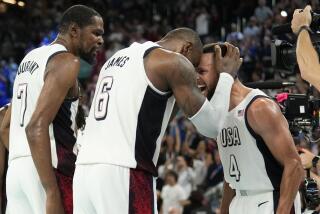He Isn’t Taking the Criticism Lying Down : Boxing: Some say Saturday’s fight against Terry Norris will end Donald Curry’s career. Curry says he can win.
PALM SPRINGS — Donald Curry, who rose from the dust of Ft. Worth to become, briefly, one of the best boxers in the world, until he was whacked senseless a few times, has agreed to an interview five days before he is to step into the ring.
For nearly two hours, not much unusual is said. He lost, he says calmly, when he had not trained properly. Had other things on his mind. Was distracted by the death of a grandfather. Was worrying too much about his schoolwork at Texas Wesleyan University.
All the while, Curry never gets out of his hotel bed.
For 1 hour 50 minutes, he talks while lying on his back, the sheet pulled up to his chin. Occasionally, he stops talking and fluffs the pillow. But always, the sheet stays high under his chin.
Saturday night, Curry will fight Terry Norris, who pummeled Sugar Ray Leonard into retirement in February, for the World Boxing Council super welterweight title in the first half of a championship doubleheader at the Radisson Palm Springs Resort. Meldrick Taylor, the World Boxing Assn. welterweight champion, will fight Luis Garcia in the other main event.
Most believe this will mark the end of Curry’s career.
“I know what they’re saying,” says Curry, 29. “I know what everyone is thinking. But Terry Norris is beatable. You just watch.”
For nearly six years, everyone watched Curry, and what they saw was a boxing marvel, a composite of the great fighters. Utilizing fast feet, faster hands and superb coordination, Curry beat 25 opponents in a row, knocking out 19.
He was a master, the owner of thunder in both hands and defensive skills that left opponents delivering desperate punches to the area of the ring where Curry used to be.
“Invincible,” Curry says from bed. “I knew no one could beat me. I knew there wasn’t another fighter in the world who could handle me in the welterweight division. And at times, I felt so invincible that I believed no fighter in any weight division could beat me.”
And then lightly regarded Lloyd Honeyghan of England punched Curry’s lights out one September night in 1986 at Atlantic City, N.J., stripping away Curry’s undisputed world welterweight championship.
And his shield.
A six-round battering left Curry’s left eye swollen and bloodied and his brain a bit scrambled. He staggered back to his corner after the sixth round, and doctors halted the bout.
At 25, the whole world suddenly had changed for Curry.
“It was no big deal,” Curry says now. “I didn’t train, had to lose more than 10 pounds in a week to make weight. Just wasn’t up for Honeyghan. Just didn’t believe he would be much of a contest for me. But the next day, I forgot about it.”
Perhaps. But boxers don’t usually forget that kind of thing, although all say they do.
Pipino Cuevas of Mexico, the welterweight champion of the mid-1970s, had that aura of invincibility until a young Thomas Hearns landed a right to his chin. Cuevas never was the same fighter after that brutal knockout, although he often proclaimed that the loss to Hearns meant nothing.
And Hearns himself has never been the same fighter since the night former middleweight champion Marvelous Marvin Hagler caused him to do a bizarre, sideways crab-dance across a ring at Las Vegas with a brutal thump on the head.
Curry came back after his beating by Honeyghan. He won two meaningless fights on disqualifications. And then he stepped back into the world picture with a bout against Mike McCallum.
McCallum, the junior middleweight champion, knocked Curry out with one crisp, devastating left hook that made a sickeningly loud, cracking sound as it slammed against Curry’s jaw in the fifth round. Curry fell backward, out long before he hit the canvas. At referee Richard Steele’s count of eight, Curry sat up, looking like a creature that rises from a coffin in a horror film, his eyes focusing on things no one else could see.
“I got cocky,” Curry explains. “I was winning the fight and I just got cocky. I dropped my hands. No way that should have happened.”
In 1988, Curry won the WBC super welterweight title by knocking out Gianfranco Rosi in San Remo, Italy. The punch was still there.
But so were the problems.
A year later, he lost that title to Rene Jacquot in Grenoble, France.
“I watched films of this guy before we fought, and he was terrible,” Curry says. “Just terrible. I couldn’t believe this guy was even a fighter. So I didn’t train. I didn’t get ready.”
Last year, with a shot at Michael Nunn’s International Boxing Federation middleweight crown, Curry said he was told by friends that he shouldn’t run his usual six or eight miles a day to train. So he ran only three miles a day. And Nunn knocked him out in the 10th round.
“For Nunn, I was motivated, but I hadn’t done the running I needed and I got tired,” Curry says.
On the surface, Curry still looks the same in the ring. He appears as fast as ever and as strong as ever. But those who make a living from watching and interpreting the movements of boxers have detected a change since his losses to Honeyghan and McCallum.
“I think all fighters change after the first time they get tagged like Donald Curry did,” says Joe Sayatovich, veteran fight trainer and manager who will bring Norris, 23, into the ring against Curry. “They all get hesitant. Where they used to drive in and deliver their best shot, they now hold back a bit, thinking more about getting tagged on their own chin than about delivering that punch.
“They all think they’re invincible, right up until they get knocked out. And then, they change. Donald Curry, today, I don’t believe belongs in the same ring with a fighter like Terry Norris, to be honest. Maybe at his peak, five or six years ago, it would have been a nice fight for seven or eight rounds. But not today. Not now.
“Not after what Donald Curry has been through.”
Curry has heard the talk.
“For me, this is do or die,” he says, raising his head off the pillow. “If I lose, there is nowhere for me to go. And this time there have been no distractions. I’ve trained harder than I ever have before and feel better than I ever have before.
“You know, when I was Norris’ age, I was a complete fighter. I could do everything. I was unbeatable. He isn’t at that level yet.”
And Curry, it seems, isn’t at that level, either. Not anymore. Not since he discovered that unconsciousness and his chin were fairly close friends.
More to Read
Go beyond the scoreboard
Get the latest on L.A.'s teams in the daily Sports Report newsletter.
You may occasionally receive promotional content from the Los Angeles Times.










